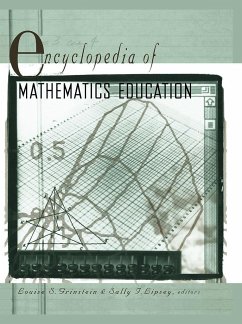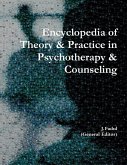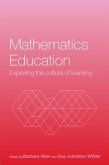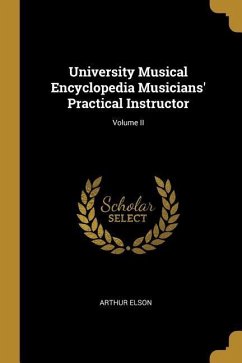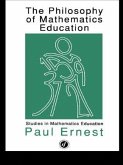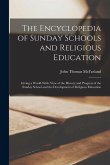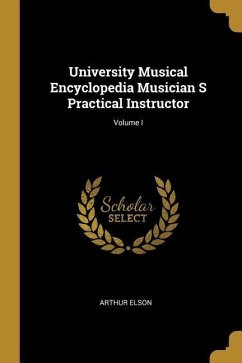- Broschiertes Buch
- Merkliste
- Auf die Merkliste
- Bewerten Bewerten
- Teilen
- Produkt teilen
- Produkterinnerung
- Produkterinnerung
First Published in 2001. Routledge is an imprint of Taylor & Francis, an informa company.
Andere Kunden interessierten sich auch für
![Encyclopedia of Theory & Practice in Psychotherapy & Counseling Encyclopedia of Theory & Practice in Psychotherapy & Counseling]() Fadul (General Editor) Jose A.Encyclopedia of Theory & Practice in Psychotherapy & Counseling175,99 €
Fadul (General Editor) Jose A.Encyclopedia of Theory & Practice in Psychotherapy & Counseling175,99 €![Mathematics Education Mathematics Education]() Sue Johnston-Wilder (ed.)Mathematics Education55,99 €
Sue Johnston-Wilder (ed.)Mathematics Education55,99 €![Fadul's Encyclopedia of Bells Fadul's Encyclopedia of Bells]() Jose A. FadulFadul's Encyclopedia of Bells132,99 €
Jose A. FadulFadul's Encyclopedia of Bells132,99 €![University Musical Encyclopedia Musicians' Practical Instructor; Volume II University Musical Encyclopedia Musicians' Practical Instructor; Volume II]() Arthur ElsonUniversity Musical Encyclopedia Musicians' Practical Instructor; Volume II29,99 €
Arthur ElsonUniversity Musical Encyclopedia Musicians' Practical Instructor; Volume II29,99 €![The Philosophy of Mathematics Education The Philosophy of Mathematics Education]() Paul ErnestThe Philosophy of Mathematics Education86,99 €
Paul ErnestThe Philosophy of Mathematics Education86,99 €![The Encyclopedia of Sunday Schools and Religious Education: Giving a World-Wide View of the History and Progress of the Sunday School and the Developm The Encyclopedia of Sunday Schools and Religious Education: Giving a World-Wide View of the History and Progress of the Sunday School and the Developm]() John Thomas McfarlandThe Encyclopedia of Sunday Schools and Religious Education: Giving a World-Wide View of the History and Progress of the Sunday School and the Developm28,99 €
John Thomas McfarlandThe Encyclopedia of Sunday Schools and Religious Education: Giving a World-Wide View of the History and Progress of the Sunday School and the Developm28,99 €![University Musical Encyclopedia Musician S Practical Instructor; Volume I University Musical Encyclopedia Musician S Practical Instructor; Volume I]() Arthur ElsonUniversity Musical Encyclopedia Musician S Practical Instructor; Volume I29,99 €
Arthur ElsonUniversity Musical Encyclopedia Musician S Practical Instructor; Volume I29,99 €-
-
-
First Published in 2001. Routledge is an imprint of Taylor & Francis, an informa company.
Hinweis: Dieser Artikel kann nur an eine deutsche Lieferadresse ausgeliefert werden.
Hinweis: Dieser Artikel kann nur an eine deutsche Lieferadresse ausgeliefert werden.
Produktdetails
- Produktdetails
- Verlag: Taylor & Francis
- Seitenzahl: 912
- Erscheinungstermin: 7. Juli 2015
- Englisch
- Abmessung: 274mm x 211mm x 49mm
- Gewicht: 2044g
- ISBN-13: 9780415763684
- ISBN-10: 0415763681
- Artikelnr.: 40819833
- Herstellerkennzeichnung
- Libri GmbH
- Europaallee 1
- 36244 Bad Hersfeld
- gpsr@libri.de
- Verlag: Taylor & Francis
- Seitenzahl: 912
- Erscheinungstermin: 7. Juli 2015
- Englisch
- Abmessung: 274mm x 211mm x 49mm
- Gewicht: 2044g
- ISBN-13: 9780415763684
- ISBN-10: 0415763681
- Artikelnr.: 40819833
- Herstellerkennzeichnung
- Libri GmbH
- Europaallee 1
- 36244 Bad Hersfeld
- gpsr@libri.de
Louise S. Grinstein received a Ph.D. from Columbia University in mathematics education. She has worked in industry as a computer programmer and systems analyst. She is currently Professor Emeritus of mathematics and computer science at Kingsborough Community College of CUNY. Sally I. Lipsey received an Ed.D. from Columbia University where she studied mathematics in the faculty of pure science, and mathematics education at Teachers College. She is now retired, but was an associate professor of mathematics at Brooklyn College, CUNY and is currently president of Women and Mathematics Education.
I. Applications Acturial mathematics
applications for the classroom
overview
economics
environmental mathematics
health
modeling
numerical analysis
operations research
population growth
sports. II. Assessment Assessment of student achievement
overview
evaluation of instruction
overview
National Assessment of Educational Progress. III. Content and Instructional Procedures Abstract algebra
addition
algebraic numbers
algorithms
arithmetic
axioms
calculus
overview
continuity
data representation
decimal system
inequalities
inverse functions
mathematics
foundations
mathematics, nature of
number sense and numeration
number theory, overview
probability in elementary school mathematics
statistics, overview. IV. Curriculum Addition
curriculum trends
secondary level
discrete mathematics
integration of elementary school mathematics instruction with other subjects
standards, curriculum. V. Enrichment Art
enrichment, overview
family math
games
projects for students
recreations, overview. VI. Governmental Role Federal governement, role of
mathematics education
statistical indicators of
state government, role. VII. History of Mathematics History of mathematics, overview
Abel, Archimedes, Bernouilli Family, etc
African customs applied to the mathematics classroom, Babylonian mathematics, Islam, etc. VIII. Issues Assessment of student achievement, issues
basic skills
developmental (remedial) mathematics
ethnomathematics
evaluation of instruction, issues
gifted, special programs for
learning disabilities, overview
mathematics, philosophical issues
mathematics anxiety
minorities, educational problems
applications for the classroom
overview
economics
environmental mathematics
health
modeling
numerical analysis
operations research
population growth
sports. II. Assessment Assessment of student achievement
overview
evaluation of instruction
overview
National Assessment of Educational Progress. III. Content and Instructional Procedures Abstract algebra
addition
algebraic numbers
algorithms
arithmetic
axioms
calculus
overview
continuity
data representation
decimal system
inequalities
inverse functions
mathematics
foundations
mathematics, nature of
number sense and numeration
number theory, overview
probability in elementary school mathematics
statistics, overview. IV. Curriculum Addition
curriculum trends
secondary level
discrete mathematics
integration of elementary school mathematics instruction with other subjects
standards, curriculum. V. Enrichment Art
enrichment, overview
family math
games
projects for students
recreations, overview. VI. Governmental Role Federal governement, role of
mathematics education
statistical indicators of
state government, role. VII. History of Mathematics History of mathematics, overview
Abel, Archimedes, Bernouilli Family, etc
African customs applied to the mathematics classroom, Babylonian mathematics, Islam, etc. VIII. Issues Assessment of student achievement, issues
basic skills
developmental (remedial) mathematics
ethnomathematics
evaluation of instruction, issues
gifted, special programs for
learning disabilities, overview
mathematics, philosophical issues
mathematics anxiety
minorities, educational problems
I. Applications Acturial mathematics
applications for the classroom
overview
economics
environmental mathematics
health
modeling
numerical analysis
operations research
population growth
sports. II. Assessment Assessment of student achievement
overview
evaluation of instruction
overview
National Assessment of Educational Progress. III. Content and Instructional Procedures Abstract algebra
addition
algebraic numbers
algorithms
arithmetic
axioms
calculus
overview
continuity
data representation
decimal system
inequalities
inverse functions
mathematics
foundations
mathematics, nature of
number sense and numeration
number theory, overview
probability in elementary school mathematics
statistics, overview. IV. Curriculum Addition
curriculum trends
secondary level
discrete mathematics
integration of elementary school mathematics instruction with other subjects
standards, curriculum. V. Enrichment Art
enrichment, overview
family math
games
projects for students
recreations, overview. VI. Governmental Role Federal governement, role of
mathematics education
statistical indicators of
state government, role. VII. History of Mathematics History of mathematics, overview
Abel, Archimedes, Bernouilli Family, etc
African customs applied to the mathematics classroom, Babylonian mathematics, Islam, etc. VIII. Issues Assessment of student achievement, issues
basic skills
developmental (remedial) mathematics
ethnomathematics
evaluation of instruction, issues
gifted, special programs for
learning disabilities, overview
mathematics, philosophical issues
mathematics anxiety
minorities, educational problems
applications for the classroom
overview
economics
environmental mathematics
health
modeling
numerical analysis
operations research
population growth
sports. II. Assessment Assessment of student achievement
overview
evaluation of instruction
overview
National Assessment of Educational Progress. III. Content and Instructional Procedures Abstract algebra
addition
algebraic numbers
algorithms
arithmetic
axioms
calculus
overview
continuity
data representation
decimal system
inequalities
inverse functions
mathematics
foundations
mathematics, nature of
number sense and numeration
number theory, overview
probability in elementary school mathematics
statistics, overview. IV. Curriculum Addition
curriculum trends
secondary level
discrete mathematics
integration of elementary school mathematics instruction with other subjects
standards, curriculum. V. Enrichment Art
enrichment, overview
family math
games
projects for students
recreations, overview. VI. Governmental Role Federal governement, role of
mathematics education
statistical indicators of
state government, role. VII. History of Mathematics History of mathematics, overview
Abel, Archimedes, Bernouilli Family, etc
African customs applied to the mathematics classroom, Babylonian mathematics, Islam, etc. VIII. Issues Assessment of student achievement, issues
basic skills
developmental (remedial) mathematics
ethnomathematics
evaluation of instruction, issues
gifted, special programs for
learning disabilities, overview
mathematics, philosophical issues
mathematics anxiety
minorities, educational problems

